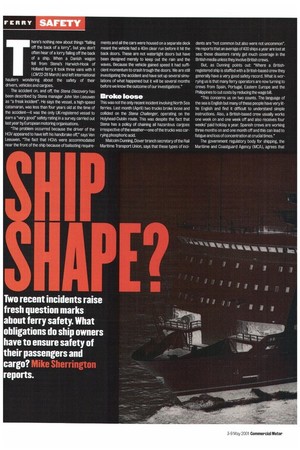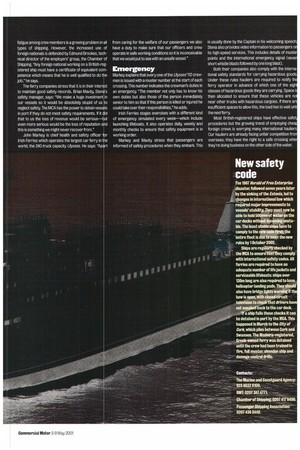SAFETY
Page 44

Page 45

If you've noticed an error in this article please click here to report it so we can fix it.
Two recent incidents raise fresh question marks about ferry safety. What obligations do ship owners have to ensure safety of their passengers and cargo? Mike Sherrington reports. There's nothing new about things "falling off the back of a lorry', but you don't often hear of a lorry falling off the back of a ship. When a Danish wagon fell from Stena's Harwich-Hook of Holland ferry it took three vans with it (CM22-28 March) and left international hauliers wondering about the safety of their drivers, vehicles and cargoes.
The accident on, and off, the Stena Discovery has been described by Stena manager John Ven Leeuwen as "a freak incident". He says the vessel, a high-speed catamaran, was less than four years old at the time of the accident—it was the only UK-registered vessel to earn a "very good" safety rating in a survey carried out last year by European motoring organisations.
"The problem occurred because the driver of the HGV appeared to have left his handbrake off," says Ven Leeuwen. "The fact that HGVs were accommodated near the front of the ship because of ballasting require
ments and all the cars were housed on a separate deck meant the vehicle had a 40m clear run before it hit the back doors. These are not watertight doors but have been designed merely to keep out the rain and the waves. Because the vehicle gained speed it had sufficient momentum to crash trough the doors. We are still investigating the accident and have set up several simulations of what happened but it will be several months before we know the outcome of our investigations."
Broke loose
This was not the only recent incident involving North Sea ferries. Last month (April) two trucks broke loose and collided on the Stena Challenger, operating on the Holyhead-Dublin route. This was despite the fact that Stena has a policy of chaining all hazardous cargoes irrespective of the weather—one of the trucks was carrying phosphoric acid.
Malcolm Dunning, Dover branch secretary of the Rail Maritime Transport Union, says that these types of inci
dents are "not common but also were not uncommon". He reports that an average of 400 ships a year are lost at sea; these disasters rarely get much coverage in the British media unless they involve British crews.
But, as Dunning points out: "Where a Britishregistered ship is staffed with a British-based crew they generally have a very good safety record. What is worrying us is that many ferry operators are now turning to crews from Spain, Portugal, Eastern Europe and the Philippines to cut costs by reducing the wage bill.
"This concerns us on two counts. The language of the sea is English but many of these people have very little English and find it difficult to understand simple instructions. Also, a British-based crew usually works one week on and one week off and also receives four weeks' paid holiday a year. Spanish crews are working three months on and one month off and this can lead to fatigue and loss of concentration at crude! times."
The government regulatory body for shipping, the Maritime and Coastguard Agency (MCA), agrees that fatigue among crew members is a growing problem in all types of shipping. However, the increased use of foreign nationals is defended by Edmund Brookes, technical director of the employers' group, the Chamber of Shipping. 'Any foreign national working on a British-registered ship must have a certificate of equivalent competence which means that he is well qualified to do the job," he says.
The ferry companies stress that it is in their inter st to maintain good safety records. Brian Mavity, Ste 's safety manager, says: We make a huge investment in our vessels so it would be absolutely stupid of us neglect safety. The MCA has the power to detain ves Is in port if they do not meet safety requirements. If it id that to us the loss of revenue would be serious— ut even more serious would be the loss of reputation a d this is something we might never recover from."
John Markey is chief health and safety officer r Irish Ferries which operates the largest car ferry in t e world; the 240-truck capacity IlYsses. He says: "Ap. rt from caring for the welfare of our passengers we also have a duty to make sure that our officers and crew operate in safe working conditions so it is inconceivable that we would put to sea with an unsafe vessel."
Emergency
Markey explains that every one of the Ulysses'112 crewmen is issued with a muster number at the start of each crossing. This number indicates the crewman's duties in an emergency. "The member not only has to know his own duties but also those of the person immediately senior to him so that if this person is killed or injured he could take over their responsibilities," he adds.
Irish Ferries stages exercises with a different kind of emergency simulated every week—which include launching lifeboats. It also operates daily, weekly and monthly checks to ensure that safety equipment is in working order.
Markey and Mavity stress that passengers are informed of safety procedures when they embark. This is usually done by the Captain in his welcoming speech Stena also provides video information to passengers o its high-speed services. This includes details of muste points and the international emergency signal (seve short whistle blasts followed by one long blast).
Both their companies also comply with the interna tional safety standards for carrying hazardous goods Under these rules hauliers are required to notify th ferry operator in advance of which one of the eigh classes of hazardous goods they are carrying. Space i then allocated to ensure that these vehicles are no near other trucks with hazardous cargoes. If there ar insufficient spaces to allow this, the load has to wait un the next ferry.
Most British-registered ships have effective safe procedures but the growing trend of employing chea foreign crews is worrying many international hauliers Our hauliers are already facing unfair competition fro overseas; they have the right to a safe crossing whe they're doing business onthe other side of the water.
New safety code
The 1987 floral( ref Free Enterprise disaster, followed seven years later by the sinking of the Estonia, led to changes in international law which required major improvements to vessels' stability. They must now be able to hold 500mm of water on the car decks without becoming unstable. The least stable ships have to comply to the new code first; the entire fleet is due to meet the new rules by 1 October 2002.
Ships are regularly checked by the MCA to ensure that they comply with international safety codes. All ferries are required to have an adequate number of life jackets and serviceable lifeboats: ships over 130m long are also required to have helicopter landing pads. They should also have bridge lights warning if th bow is open, with closed circuit television to check that drivers have not sneaked back to the car deck.
If a ship fails these checks it can be detained in port by the MCA. This happened in March to the City of Cork, which plies between Cork and Swansea. The Madeira-registered, Greek-owned ferry was detained until the crew had been trained in fire, full muster, abandon ship and damage control drills.
































































































